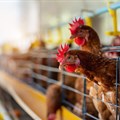South Africa's poultry industry is facing significant challenges, primarily due to its reliance on low-margin Individually Quick Frozen (IQF) products. These mixed portions, which make up 70-75% of local production, target low-income consumers but offer limited financial returns for producers, threatening the sector's growth and profitability.

Source: ©Andor Bujdoso via
123RFHowever, industry experts suggest a pivot to higher-value products could help unlock new growth opportunities.
Dr Gustav Brink, a mercantile law lecturer at the University of Pretoria and anti-dumping expert, emphasized the need for innovation in the poultry industry. “The industry needs to pivot towards value-added products to ensure sustainability. The sector should focus on ready-made chicken meals or canned options,” Brink stated, citing Astral’s canned chicken with gravy as a positive example of this approach.
“By investing in premium products such as deboned, skinless chicken breasts or pre-cooked meals, South African producers could tap into higher-margin markets and reduce their reliance on low-cost goods,” Brink said.
Trade barriers and export challenges
Addressing trade barriers and export challenges, Brink said policy changes could make South Africa’s poultry market more attractive.
He explained that strict sanitary and phytosanitary (SPS) measures—regulations that protect human, animal, and plant health and life from pests and diseases—imposed by the European Union (EU) and the United States have limited South Africa’s ability to compete globally.
One issue is brining, wherein poultry is injected with saltwater to increase its weight and flavour. Whereas the international norm for brining is up to 8%, South African producers use up to 15%, which he said has created a competitive disadvantage.
"If we meet these requirements, we could export chicken breasts to the EU and import their leg quarters. This would balance market demands while catering to local consumer preferences for dark meat cuts like thighs and drumsticks," Brink said.
Addressing such trade barriers could also ease tensions over anti-dumping duties and import quotas, which often restrict South African poultry exports.
Brink stressed that improved diplomacy and predictable trade policies would foster a more predictable, mutually advantageous environment for both producers and their trade partners.
Bureaucracy and legislative gaps
Brink bemoaned inefficiencies within the International Trade Administration Commission (ITAC), which he argued further stifles progress.
He criticised the body for failing to meet the World Trade Organisation’s 12-month deadline for anti-dumping investigations, with some cases dragging on for years.
He called for the modernisation of ITAC’s processes, including a move away from outdated methods such as requiring hard copies and CD-ROM submissions. "Modernising ITAC’s processes would drastically improve efficiency," he said.
South Africa’s outdated trade remedies legislation also presents a significant challenge. “Unlike the EU, which reviews its framework every five years, South Africa has not updated its legislation in over two decades.”
Brink called for a comprehensive overhaul, suggesting digitisation, standardised procedures, and improved training for ITAC staff to restore trust and efficiency in the system.
Import Tariffs
Import tariffs remain a contentious issue. While designed to protect local producers from international competition, they also contribute to higher poultry prices.
Research by the Reserve Bank on the consumer price effects of specific trade policy restrictions in South Africa released in 2022 found that removing tariffs could lower prices by 10–12%, but such a move risks devastating the local industry, leading to widespread job losses and business closures.
Brink said there was a need for a balanced approach. “Because relying too heavily on government support discourages innovation and competitiveness, but completely removing protections would be disastrous for local producers, so there’s a need for policy change in this regard,” he said.
New entrants changing the market
Despite these challenges, the sector is witnessing the rise of new entrants, particularly those supported by Black Economic Empowerment (BEE) initiatives. Smaller producers, often more agile than larger firms, are reinvesting profits and driving efficiency in ways that benefit the broader market.
"Smaller firms are not weighed down by high overhead costs. They prioritise reinvestment and bring fresh competition," Brink noted. He emphasised the need for better training and financial support for emerging farmers, especially those participating in land redistribution programmes.
This surge of new producers is pushing established companies to rethink their strategies. Larger firms are being encouraged to streamline operations and invest in innovation to maintain competitiveness in an evolving market.
Shifting from low-value to value-added products offers a path to increased profitability and reduced reliance on government support. However, achieving this requires streamlined regulations, efficient trade remedies, and targeted investments in infrastructure.
At the same time, domestic concerns—such as consumer affordability and the empowerment of new entrants—must remain central to industry reforms. Balancing these priorities is critical to ensuring the sector’s resilience and long-term growth.
"With the right reforms and investments, the poultry sector could drive economic growth while meeting the nutritional needs of millions," Brink said.































